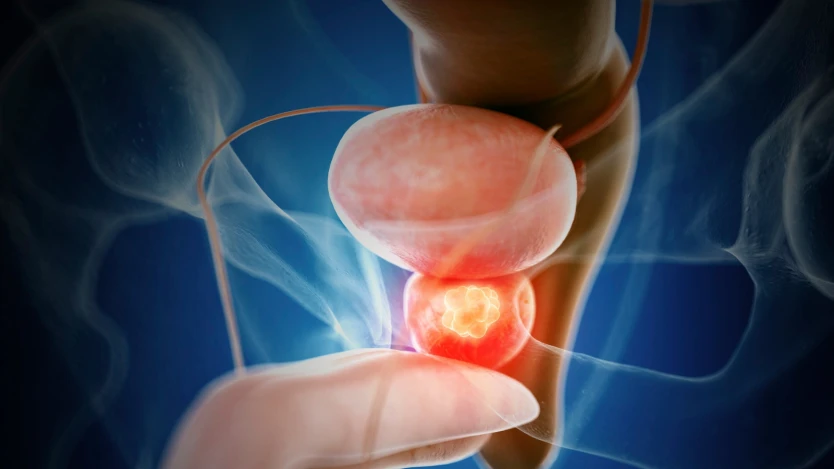Inflamed prostate: what it is, causes, symptoms and treatments

- Enlarged prostate vs. prostate inflammation
- What is prostatitis (inflamed prostate)?
- What are the causes of an inflamed prostate?
- Symptoms of an inflamed prostate (prostatitis)
- How is an inflamed prostate diagnosed?
- Treatments for inflamed prostate
- Request consultation for surgical assessment of benign prostatic hyperplasia
Enlarged prostate vs. prostate inflammation
- Inflammation of the prostate is called prostatitis and is usually caused by bacteria.
- Inflamed prostate can be prostatitis, which is prostatic inflammation due to bacterial infection, as well as benign prostatic hyperplasia, anatomical inflammation of hormonal causes.
- Age-related enlargement of the prostate is called benign prostatic hyperplasia (BPH) and its origin is unknown.
Before going into details about the causes, symptoms and how to solve the problems caused by an inflamed prostate, we believe it is necessary to clarify the differences between prostate enlargement, benign prostatic hyperplasia (BPH), and prostate inflammation, prostatitis.

Do you need a private consultation with an Urologist?
Purchase your medical voucher easily under Operarme's guarantees and select your nearest clinic.
Enlarged Prostate = Benign Prostatic Hyperplasia (BPH)
Benign prostatic hyperplasia (BPH) is characterised by an enlarged prostate gland that causes varying degrees of bladder emptying obstruction.
The causes of BPH are unknown, but probably depend on male hormonal factors and age.
BPH is one of the most common diseases in older adult men.
BPH is the result of non-cancerous growth of the tissue that forms the prostate.
The development of BPH begins around the age of 40 with a focal phenomenon of stromal origin (reticular connective tissue supporting the prostate). From the age of 50 onwards, there is a global and rapid increase in volume due to an increase in fibromuscular and glandular tissue cells, both in the periurethral and transitional zones.
In short, this increase in prostate volume is caused by an exorbitant cell growth and a very reduced process of elimination of unnecessary or abnormal cells, leading to an imbalance of growth-promoting and growth-inhibiting factors that maintain normal growth of the prostate gland, which ultimately manifests itself in the pathology.

Inflamed prostate = Prostatitis
The term prostatitis is used to define those processes of an inflammatory or infectious nature that affect the prostate gland. They are benign processes and their occurrence is not directly related to the likelihood of developing benign prostatic hyperplasia or prostate cancer.
Prostatitis is a very common health condition in men, affecting about 25% of young and middle-aged men who need medical attention for issues related to the genital and urinary systems.
As we have been saying, prostatitis is a condition that involves inflammation of the prostate due to bacterial infection of the prostate gland, depending on its type. In any case, it is a problem that can usually be solved, in most cases, by means of pharmacological treatment without the need for surgery.
Throughout this page we will explain in detail what prostatitis is, inflammation of the prostate, its types and, of course, the possible treatments that exist to solve it.
What is prostatitis (inflamed prostate)?
Prostatitis is inflammation of the prostate gland, usually caused by a bacterial infection of the prostate gland. This is commonly referred to as an inflamed prostate, a popular term intended to reflect the concept of an enlarged prostate that causes very uncomfortable, often temporary, symptoms and signs.
To understand the particularities of prostatitis it is necessary to be able to differentiate between the different classifications of the disease. These are:
Category I: Acute Bacterial Prostatitis.
Acute prostatitis is related to a bacterial infection of the prostate and can occur in men of any age. Any organism capable of producing a urinary tract infection can produce acute bacterial prostatitis.
Category II: Chronic prostatitis or chronic pelvic pain syndrome.
This is characterised by an infection of the prostate that recurs over and over again. The symptoms are very similar to those of acute prostatitis, although there is usually no fever and they are not as severe as in acute prostatitis but can remain for a long time.
Any bacteria that can cause a urinary tract infection can lead to bacterial prostatitis.
Category III: Non-bacterial inflammatory and non-inflammatory prostatitis.
They are the most common type of prostatitis and are often a chronic condition that can affect men of any age. Urine and prostatic fluids do not show evidence of infection by microorganisms, but semen and other prostatic fluids contain cells that are usually produced when the body is faced with an infection, and inflammatory cells are also evident.
Category IV: Asymptomatic inflammatory prostatitis.
Similar to non-bacterial prostatitis in terms of symptoms, age of the patient and effectiveness of treatment. However, unlike non-bacterial prostatitis, there is no presence in the urine of cells usually produced when the body is faced with an infection.
Are you worried about having prostatitis? Click on the image below and request a diagnostic consultation with a Urology Specialist immediately and easily:

Do you need a private consultation with an Urologist?
Purchase your medical voucher easily under Operarme's guarantees and select your nearest clinic.
What are the causes of an inflamed prostate?
The main causes of an inflamed prostate or prostatitis depend on the classification of the pathology, as we explained in the previous section, prostate inflammation can be due to a bacterial process or not, so that each type of prostatitis can be differentiated by the causes of its appearance.
Causes of Acute and Chronic Bacterial Prostatitis
The most common bacteria that can cause acute as well as chronic bacterial prostatitis are:
- Enterobacteriaceae
- Enterococci
- Anaerobes
On the other hand, acute or chronic prostatitis may also be caused by sexually transmitted diseases (STDs) such as gonorrhoea, chlamydia and trichomonas (parasites of the urogenital tract).

Similarly, it is possible to suffer from acute or chronic bacterial prostatitis due to:
- Catheterisation of the urethra
- Cystoscopy (technique for examining the inside of the urinary bladder)
- Trauma or blow
- Bladder outlet obstruction
- Infection elsewhere in the body
Causes of chronic prostatitis and (asymptomatic) prostatodynia
Although chronic prostatitis and prostatodynia are the most common types of prostatitis, the causes of its development are not entirely clear, however, specialists usually associate it with causes such as:
- A previous bacterial prostatitis infection
- Less common types of bacteria (Chlamydia trachomatis, Ureaplasma urealyticum, Mycoplasma hominis)
- Parasites
- Irritation caused by stagnation of urine flowing into the prostate gland
- Irritation from chemicals
- Neurological problem involving the lower urinary tract
- Pelvic floor muscle problems
- Stress and emotional factors
Symptoms of an inflamed prostate (prostatitis)
The symptomatic manifestations of an inflamed prostate depend on the type of inflammation observed and the individual characteristics of each patient.
Inflamed prostates with an infectious cause, such as prostatitis, can be divided according to the duration of inflammation:
Symptoms of Acute Bacterial Prostatitis
Inflamed prostate or acute prostatitis is caused by a bacterial infection inside the prostate. It is considered acute prostatitis when the onset of symptoms is less than 2 weeks. The most common signs are:
- Pain or a feeling of heaviness in the perineal region or lower abdomen.
- Discomfort when urinating.
- Decreased urination stream and a feeling that the bladder has not been completely emptied.
- Occasionally may cause a small amount of bleeding with urine or in semen.
- May cause fever and chills.
Acute prostatitis can also be classified on the basis of prostate-specific antigen (PSA) values, which are very high during infection and return to normal after effective treatment.
Acute prostatitis is usually identified by symptoms such as dysuria, painful urination and fever.
Symptoms of Chronic Bacterial Prostatitis.
Inflamed prostate or chronic prostatitis occurs when symptoms occur for more than a month despite antibiotic treatment. In this type of prostatitis the symptoms are much milder and more spaced out over time and it is difficult to find the presence of high fever, although it does present irritative symptoms of urinary infection.
Moreover, in many cases it is possible to have no symptoms at all.
PSA values during chronic prostatitis are generally normal or moderately elevated, an additional factor that often complicates the determination of the problem and the treatment to solve it.
Symptoms of nonbacterial prostatitis and prostatodynia
The symptom picture that characterises non-bacterial (abacterial) prostatitis as well as prostatodynia is a variety of genitourinary symptoms that focus on:
- Perineal and/or lower abdominal pain
- Penile discomfort and testicular pain
- Dysuria (difficulty or pain in passing urine).
Symptoms of abacterial prostatitis often go through cycles of lesser and greater severity.
How is an inflamed prostate diagnosed?
An inflamed prostate is diagnosed on the basis of the symptoms you present when you have a clinical interview with a urology specialist.
During the diagnosis, other disorders such as benign prostatic hyperplasia (BPH) or prostate cancer are ruled out and the type of prostatitis you have is determined.
Once the pathology is suspected, it must be confirmed with a series of complementary tests. These tests are usually:
- If acute or chronic prostatitis or an inflamed prostate due to an infectious cause is suspected.
- Urinalysis
- Blood test with markers of infection and inflammation.
- Prostate massage. The urologist massages the prostate to analyse the secretions.
- Imaging tests. The urologist may order a computed tomography (CT) scan of the urinary tract and prostate, or an ultrasound of the prostate.
Are you looking for a Urology Specialist? By clicking on Purchase Consultation you can find the best specialists near you, so that they can get to know your case and determine the best treatment to solve it as soon as possible:

Do you need a private consultation with an Urologist?
Purchase your medical voucher easily under Operarme's guarantees and select your nearest clinic.
- If an inflamed prostate is suspected due to a mechanical or functional cause, it may be necessary to perform:
- Flowmetry. This is a complementary test that measures peak urine flow, urinary flow time, total volume of urination and total time of urination.
- Prostate ultrasound with prostate biopsy. This is performed in cases where markers of prostate gland growth are found to be elevated in the analytical determination.
Treatments for inflamed prostate
An inflamed prostate requires specific treatment depending on the type of pathology diagnosed. If the inflamed prostate has infectious characteristics, prostatitis, antibiotic treatment must be administered for a variable duration depending on the degree of involvement and its evolution.
Drugs are usually taken to treat prostatitis:
- Antibiotics. The specialist will choose the specific medication for your case depending on the type of bacteria that is causing the infection.
If you have severe symptoms, you will need to receive intravenous antibiotics.
Generally, the length of time you will need to continue taking oral antibioticsis about 4-6 weeks, although you may need longer treatment if you have chronic or recurrent prostatitis.
- Alpha blockers. These drugs help relax the muscle fibres and the bladder neck, the area where the prostate joins the bladder. This treatment can relieve the most bothersome symptoms, such as painful urination.
- Anti-inflammatory drugs. Nonsteroidal anti-inflammatory drugs (NSAIDs) help reduce fever, tissue inflammation and relieve pain.

Request consultation for surgical assessment of benign prostatic hyperplasia
If the cause of an inflamed prostate is an anatomical alteration (enlargement) of the gland that causes its growth and obstructive symptoms, benign prostatic hyperplasia (BPH), the definitive solution will be surgery.
On the other hand, always taking into account the degree of growth and obstruction, it is possible to significantly improve the discomfort by administering drugs that increase the calibre of the urethra and reduce the size of the prostate.
If you think that your symptoms are typical of an inflammation of the prostate due to infection, i.e. you are suffering from prostatitis, and you want to get rid of the problem as soon as possible, you can click on the image below and request a private consultation with our urologists quickly and easily:

Do you need a private consultation with an Urologist?
Purchase your medical voucher easily under Operarme's guarantees and select your nearest clinic.
Medical disclaimer: All the published content in Operarme is intended to disseminate reliable medical information to the general public, and is reviewed by healthcare professionals. In any case should this information be used to perform a diagnosis, indicate a treatment, or replace the medical assessment of a professional in a face to face consultation. Find more information in the links below:
